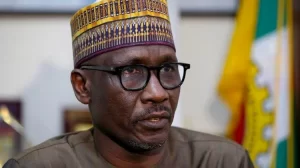The Nigerian National Petroleum Company Ltd. may need an estimated N201 billion worth of clean Premium Motor Spirit (petrol), to bring 170.25 million litres of adulterated products imported into the country up to standard, an analysis of industry data has shown.
The Nigerian Midstream and Downstream Petroleum Regulatory Authority had said on Tuesday that, for every 200 litres of the adulterated product, 800 litres of petrol with good quality would be required for the blending to be done.
“All the off-spec material (products) will be re-blended to very good quality, and it will be certified and recertified before it goes into the market. The component that was in excess was methanol; what we agreed was that for every 200 litres of the affected volume, we need about 800 litres to blend,” the Chief Executive Officer, NMDPRA, Mr. Farouk Ahmed, had said during a visit to some depots in Lagos, on Wednesday, after a meeting with industry stakeholders.
The regulator had on Tuesday, said a limited quantity of PMS with methanol quantities above Nigeria’s specification, was discovered in the supply chain.
On Wednesday, the NNPC Group Managing Director, Mele Kyari, said the national oil firm received on January 20, 2022, a report from its quality inspector on the presence of emulsion particles in PMS cargoes shipped to Nigeria from Antwerp-Belgium.
He said the NNPC investigation revealed the presence of methanol in four PMS cargoes imported by its DSDP (Direct Sale Direct Purchase) suppliers namely: MRS; Emadeb/Hyde/AY Maikifi/Brittania-U Consortium; Oando, and Duke Oil.
Under the DSDP scheme, selected overseas refiners, trading companies, and indigenous companies are allocated crude supplies in exchange for the delivery of an equal value of petrol and other refined products to the NNPC.
MRS had in a statement issued on Tuesday, said, that Duke Oil, a trading arm of the NNPC, supplied a cargo of PMS through a vessel that delivered a total of 36, 958 metric tonnes (49.56 million litres) in Apapa between January 24 and 30.
Emadeb/Hyde/AY Maikifi/Brittania-U Consortium, on Thursday, said that one of its members, Brittania-U, was the sole supplier of a cargo, containing 90, 000 MT (120.69 million litres) of PMS delivered on January 2 to 4.
681 million litres of good fuel require for two cargoes – quantity of two cargoes remains unknown.
Going by the NMDPRA’s parameter for the re-blending of the adulterated petrol, the two cargoes, containing a total of 170.25 million adulterated petrol, would require 681 million litres of clean product worth N201 billion (based on a landing cost of N295 per litre).
The N201 billion was a conservative estimate, as there were other costs that would be associated with the re-blending.
However, the quantity of the other two cargoes remained unknown as of the time of filing this report.
Meanwhile, the President Muhammadu Buhari , on Thursday, in Abuja, directed service providers to fully disclose relevant information concerning the consumption of their products and compensate dissatisfied consumers.
The Senior Special Assistant to the President on Media and Publicity, Garba Shehu, disclosed this in a statement on Thursday titled, ‘Providers of substandard fuel must be held accountable, directs President Buhari’.
Sylva had on Wednesday hinted that the government would look into possible compensation for Nigerians whose automobiles had been damaged by the contaminated fuel.
Shehu’s statement, however, quoted the president as saying that he “has ordered that producers and providers of consumable products be held accountable for substandard services and or products sold by them”.
“The President has also given directives to the relevant government agencies to take every step in line with the laws of the country to ensure the respect and protection of consumers against market abuses and social injustices.”
Reacting to the petroleum product shortages, Buhari said the protection of consumer interests was his regime’s priority, adding that he was ready to take all necessary measures to protect consumers from hazardous products, loss, or injuries from the consumption of substandard goods.
According to the presidential spokesman, Buhari has directed that, in line with the law, “service providers must make full disclosure of relevant information with respect to the consumption of their products, and that dissatisfied consumers are entitled to a proper redress of their complaints”.


